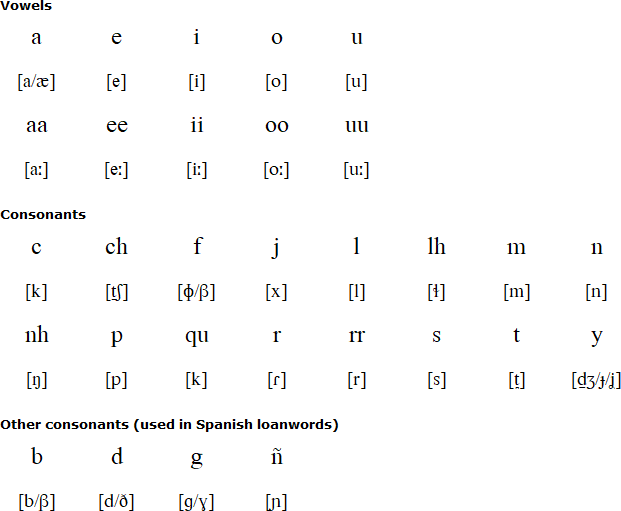Maléku is a Chibchan language spoken in northern Costa Rica along the Tonjibe river in the villages of Margarita, Tonjibe and El Sol near the town of San Rafael de Guatuso in Alajuela Province. There are about between 460 and 1,000 Maléku people, and estimates of the number of Maléku speakers range from 230 to 750. They are all bilingual in Maléku and Spanish, and there is a shift to Spanish, particularly among younger people.
Maléku is also known as Maléku Jaíka, Malecu, Maleku, Guatuso, Watuso-Wétar or Guetar. The Maleku people call their language and themselves malécu jaíca. This is also written malecu lhaíca or maléku lhaíka. Each village has its own dialect.
Maléku was first documented in 1876. A way to write Maléku with the Latin script was proposed by Dr. Adolfo Constenla Umaña, a profesor of Linguistics at the Universidad de Costa Rica who has written extensively about the language. It was adopted as the official alphabet for Maléku by the Asesoría de Educación Indígena del Ministerio de Educación Publica de Costa Rica (Indigenous Education Advisory of the Ministry of Public Education of Costa Rica). It is used as a medium of instruction, along with Spanish, in some primary schools, and is taught as a subject in a secondary school.

Download an alphabet chart for Maléku
An acute accent (á) is used to indicate stress.
Nini chíuja ní maráma anhé cocá, ó atác acsufá maráma.
Iquí nán iquí ní juactené yáj ianhé, Nharíne Cha Cónhe. Tacá ú cájayá co yáj ianhé, tan juactenéfa jué ipunhé, iquí tacá yáj ianhé, tacá ichújip. Tacá juactenéfa ní co iptórinhé ó Aóre Cha Cónhe. Tacá ilhá yája ianhé, Aóre Cha Cónhe yáj ianhé ú co. Tacá rriquí: «Mírriní pó mitonh?» Tacá rriquí: «Epéme jué ní curífa naunhéunhé, ta pó, mírri mitonh?» Tacá rriquí: «Epéme jué ní curífa naunhéunh.» Tacá ní maráma có iptórinhé ó enéque atác acsufá maráma. Chífa iptórica co rricuánhe, «Jué ní maráma punh.»
This is how they behaved extraordinarily before, those who exist of their own volition.
It is said, well, it is said that first come He at Nharíne's end. And he came to a great house, and he really became the first to be in it. It is said that he came forth, and then got tired. And first he dreamed of her, She at Aóre's end. And then she came, She at Aóre's end came to the house. And he said to her: "Where are you from?" And she said to him: "Not a short time have I existed, and you, where are you from?" And he said to her: "Not a short time have I existed." And he dreamed of them, the others who exist of their own volition. All he saw in his dream, he said: "They really exist."
Source: https://no.wikipedia.org/wiki/Maleku_(spr%C3%A5k)#Teksteksempel
Information about Maléku
https://en.wikipedia.org/wiki/Mal%C3%A9ku_language
https://es.wikipedia.org/wiki/Idioma_guatuso
https://no.wikipedia.org/wiki/Maleku_(språk)
http://www.native-languages.org/maleku.htm
https://www.elararchive.org/dk04050576/
https://www.malekuindianscostarica.com/
https://dipalicori.ucr.ac.cr/recursos-malecu/
Arhuaco, Bribri, Buglere, Cabécar, Guaymí, Kuna, Maléku, Paya, Rama, Teribe
Languages written with the Latin alphabet
Page last modified: 28.05.24
[top]
You can support this site by Buying Me A Coffee, and if you like what you see on this page, you can use the buttons below to share it with people you know.

If you like this site and find it useful, you can support it by making a donation via PayPal or Patreon, or by contributing in other ways. Omniglot is how I make my living.
Note: all links on this site to Amazon.com, Amazon.co.uk
and Amazon.fr
are affiliate links. This means I earn a commission if you click on any of them and buy something. So by clicking on these links you can help to support this site.
[top]